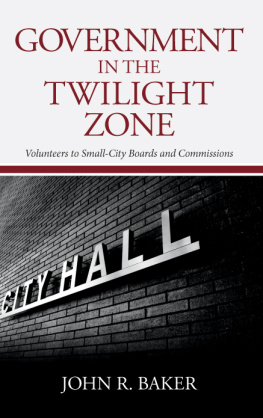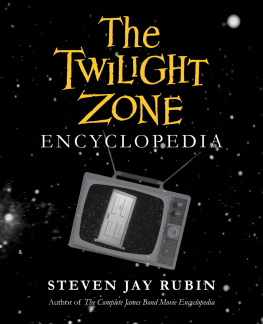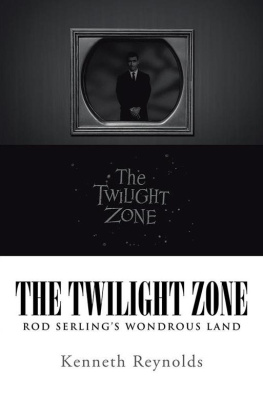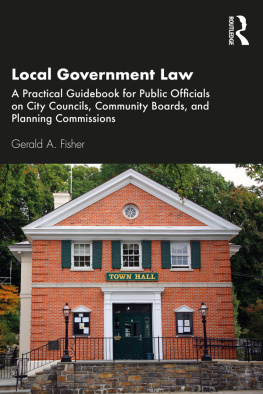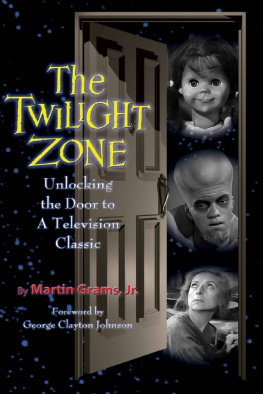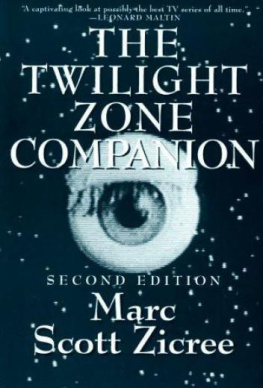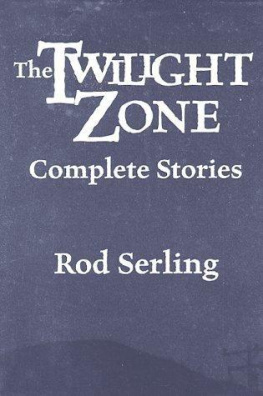Published by State University of New York Press, Albany
2015 State University of New York
All rights reserved
Printed in the United States of America
No part of this book may be used or reproduced in any manner whatsoever without written permission. No part of this book may be stored in a retrieval system or transmitted in any form or by any means including electronic, electrostatic, magnetic tape, mechanical, photocopying, recording, or otherwise without the prior permission in writing of the publisher.
For information, contact State University of New York Press, Albany, NY
www.sunypress.edu
Production, Jenn Bennett
Marketing, Michael Campochiaro
Library of Congress Cataloging-in-Publication Data
Baker, John R., 1959
Government in the twilight zone : volunteers to small-city boards and commissions / John R. Baker.
pages cm
Includes bibliographical references and index.
ISBN 978-1-4384-5631-7 (hardcover : alk. paper)
ISBN 978-1-4384-5632-4 (ebook)
1. Municipal governmentUnited States. 2. Cities and townsUnited States. I. Title.
JS331.B274 2015
320.8'50973dc23 | 2014026032 |
10 9 8 7 6 5 4 3 2 1
Acknowledgments
This book represents several years of research on small-city boards and commissions in America. As I note in the originally appeared as articles in State and Local Government Review, and I am grateful to Sage Publications for having a policy that allows authors full copyright and use authority for their work.
I want to thank my colleagues at Wittenberg University, Jeff Ankrom and Jeff Brookings, for their wise counsel and assistance with some methodological issues associated with the research. Two Wittenberg University Faculty Research Fund Board Grants allowed me to conduct the three waves of surveys that make up the bulk of the data for the project, and I greatly appreciate the enthusiastic support of my colleagues on the Board. I would also like to thank Michael Rinella at SUNY Press for seeing the promise of this work in my original manuscript proposal, and for his help and support along the way. Two anonymous reviewers made excellent suggestions that improved the manuscript, and I thank them. Finally, I want to thank the hundreds of small-city board members, city councilors, and mayors across the six states for their willingness to respond to my questions about their experiences with their board systems. I salute them for their continuing efforts to toil away in the twilight zone of small-town local governance. I know their fellow citizens do too.
INTRODUCTION
Government in the Twilight Zone
Volunteers to Small-City Boards and Commissions
Maine, the way life should be
Bridgeton, ME
Earth so rich the city grows
Blue Earth, MN
Where Southern Hospitality Begins
Portsmouth, OH
The Heart of Northwest Arkansas
Springdale, AR
A City Apart
Forest Acres, SC
Quartzsite, Where the Sun Comes to Play
Quartzsite, AZ
In his clarion call for more research on American local governments, Eric Oliver argues that unlike the highly ideological and partisan nature of national politics and governance, the distinguishing characteristic of local democratic politics is its managerial nature (2012, 6). Although many conflicts arise and must be mediated at the local level, they are primarily parochial and usually temporary, resolved by the managerial and custodial abilities of the local officials. In short, local political leaders must play the important role of custodians of place (Lewis & Neiman, 2009, xvi), and as issues emerge, parochial as they may be, the expectation is that they will be managed and resolved in a way that will help maintain the quality of life and community standards expected by the citizens. As Oliver correctly notes, however, this does not mean that local politics are meaningless or shallow (2012, 7), but rather that conflicts typically are associated with land uses, growth concerns, or more localized and particularized issues that bubble up periodically and must be tended to and resolved. This is particularly true in smaller cities where the norm is often one of a more tranquil equilibrium punctuated by infrequent, but upsetting nonetheless, controversies and concerns.
Local government in America, made up of more than 80,000 individual jurisdictions, is what Oliver refers to as a political behemoth (2012, 2) due to the enormous economic impact it has with billions of dollars of expenditures and revenues. Yet the attention paid to local governments by scholars pales in comparison to that paid to national government and politics. Although a fairly substantial literature exists on large urban American cities, much of that good work has been case study in nature, and thus somewhat limited in its external validity. And when it comes to small cities, an especially large lacuna exists in our understanding of the politics and governance of these types of jurisdictions. This is unfortunate, as most individual cities and towns across the states are smaller in size, not large urban central cities. Although the definition of small city is not standardized (Oliver, 2012, for example, uses 100,000 as the threshold population), 50,000 is the threshold used by Brennan and Hoene, who make the salient point that a whopping 97% of American communities are of this size (2007, 69)! With so many of us experiencing civic life in smaller communities, a much more concerted effort needs to be given toward understanding the governance and politics of these jurisdictions. This book has been written with that need in mind. As referred to more specifically in more recent years, thereby improving our understanding of how millions of Americans seek to govern themselves at the local level.
Overview and Synopsis of the Book
Most cities in the country have a number of advisory boards and commissions to deal with particular aspects of local policymaking. Some of these entities are mandated by state or federal law, whereas others are established by local ordinances and charters. Regardless of their origins these boards function, particularly in smaller cities, as an advisory committee system to the city council and mayor in that decisions by the boards are usually subject to final council action. Despite their de jure advisory role, however, these local boards often become the arena for a considerable amount of de facto decision making on key policy issues and controversies. Moreover, it should be noted that a few boards have legal authority to make final decisions on some or all of the issues that come before them. Thus local boards and commissions are essential to city governance and policymaking, especially in small cities. Yet, in most cities these entities function in relative obscurity, performing their important duties with little fanfare, public scrutiny, or media attentionoperating in the twilight zone of local public affairs. In spite of this, though, forces such as unfunded mandates, in-migration, growth, and development, have combined to put pressure on elected officials to mediate the political conflicts that arise, further elevating the importance of these boards to the local governance process (e.g., see Johnson & Beale, 1995; Wolf, 1999; Brennan & Hoene, 2007). As their importance increases, so too does the need to understand them, especially as several smaller communities are becoming more populous (Sulzberger, 2011), and millions of American citizens live in cities with populations below 50,000.


